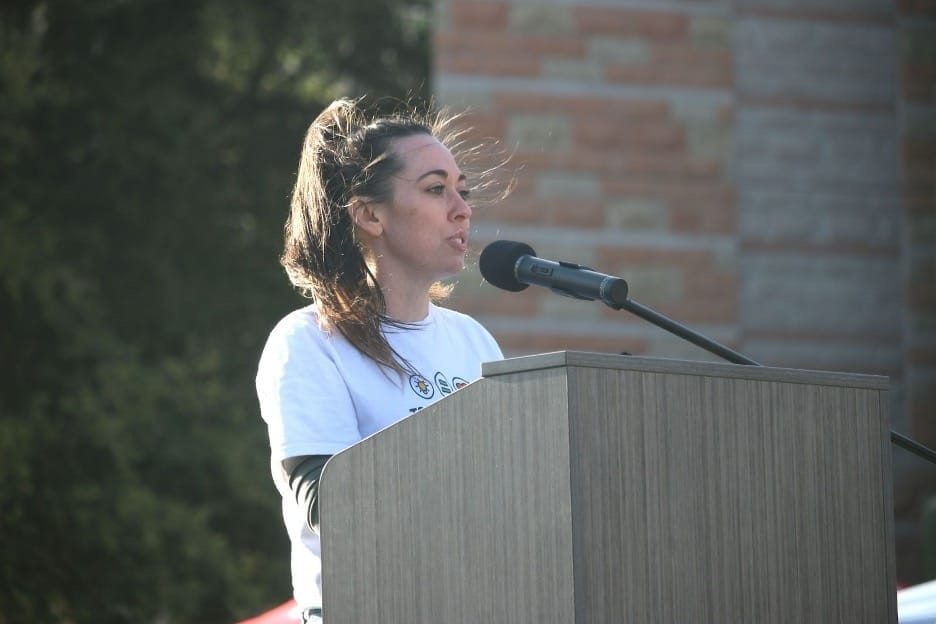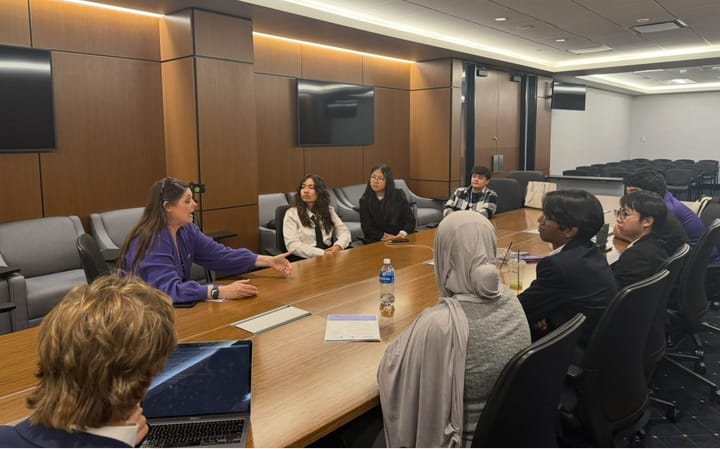‘Wildcats Roar’ event unites campus and community against sexual violence
The University of Arizona hosted its second annual Wildcats Roar Against Sexual Violence, bringing together students, survivors, and community leaders for a day of advocacy, healing, and support.

Elected officials, students and advocates came together for the University of Arizona’s Wildcats Roar Against Sexual Violence event last Wednesday, urging the community to stand in solidarity with survivors.
The event combined a 5K run, survivor speakout, resource fair and opportunities for community action and was hosted by the UA’s Office of Public Safety, Survivor, Survivor Support Services and other community groups.
Steven Patterson, vice president of the UA’s Office of Public Safety, said his office works closely with the Campus Health’s Survivor Support Services to support victims of sexual and intimate partner violence.
“We will continue our work and strive to make sure that everyone on this campus is safer and feels safer,” he said at the event.
The Southern Arizona Center Against Sexual Violence provides crisis services, advocacy, and support for individuals and families impacted by sexual trauma. Director Katlyn Monje opened the event with calls for the community to stand together with survivors of sexual violence,
“Today, we focus on hope. Sexual assault is a violation on the human dignity and its impact is felt deeply by survivors, their families and communities everywhere,” Monje said. “Through awareness and education and advocacy, we can create a world where sexual assault is no longer tolerated and where survivors are supported, believed and empowered.”
Roughly one in five women and one in 71 men have been raped in their lifetime, according to SACASA, which also reports that one in four girls and one in six boys will be sexually assaulted by the age of 18.
The nonprofit Culture of Peace Alliance serves as the fiscal sponsor for Tucson’s annual Take Back The Night event. Co-founder Sat Bir Kaur Khalsa lived in Toronto in the 1970s and, along with other woman in the community, founded a women’s health collective that established Toronto’s first rape crisis center.

Khalsa talked about the messaging behind Take Back The Night.
“Women were told they shouldn't go out at night. They were blamed for how they dressed, whether they drank, where they were, what they did,” she said. “This is an effort to bring together people that have resources that they offer to the community to show support for the community, and to raise funds so that we can keep doing these programs that support the survivors.”
Associated Students of the University of Arizona President Adriana Grijalva talked about how local resources, including Survivor Support Services and SACASA, helped her feel less alone after she recently experienced sexual violence,
“Today is a reminder that we're all in this together. No one has to go through this alone,” she said. “There is help, there is support, and there are people who truly care and that are listening. We're here to stand for those who are suffering in silence. There is strength in our unity and together, we can make a difference.”
Survivor Support Services offers individualized support to survivors of interpersonal violence. A 2023 survey done by the program showed that 77% of students who’ve used their services said they felt more empowered, while 78% say that the program helped them continue their education..
“Survivor advocacy has been a source of strength, stability, and care that has changed my life forever,” one student said. “It felt like I had finally found an ally in a world that had become intense, confusing, and terrifying.”
Beyond the UA campus, several groups and agencies are working in the community to make sure victims are taken seriously and supported.
Charlene Mendoza, Mayor Regina Romero’s chief of staff, was on hand to declare April as Sexual Assault Awareness Month.
“Every person has the right to live free from violence and (that) empowers each of us to call for policies, practices and cultural shifts that promote respect, consent and safety for all individuals,” she said.

Assistant Tucson Police Chief Diana Duffy said the department has taken steps in recent years to streamline the processing of sexual assault evidence through their in-house crime lab. TPD partners with SACASA to provide victims with an advocate to help them navigate the process of reporting their assault.
“This is why we need to keep working together — law enforcement, advocates, counselors and the community — to foster trust, break the silence and create an environment where survivors feel safe, supported and empowered,” she said.
Pima County Attorney Laura Conover reassured community members that regardless of their background, seeking justice should not be discriminatory.
“Perhaps you are uncertain about your immigration status and uncertain as to whether you can gain help in the middle of a trauma when you need it most. Perhaps you are in the LGBTQIA community. And perhaps most of all, you are lost because you are becoming a statistic of the missing and murdered indigenous women and children,” she said. “We must reassure our friends, our neighbors, our family, that they are safe here. We see you. You are welcome here, and you are safe here, and that is where prevention starts.”
The Pima County Attorney Office’s Victim Services Division was founded in 1975, the first division of its kind in the United States.
With the division turning 50 years old this year, Special Staff Assistant C.T. Revere reflected on the mission and values the office holds when it comes to victims of crime.
“Our primary function is holding people accountable,” he said. “When we're dealing with with domestic violence or sexual assault, those are very serious crimes. It's really about helping people to understand how it's not acceptable.”
In addition to partnering with SACASA, the county attorney’s office also partners with the Southern Arizona AIDS Foundation to provide support for LGBTQ+ victims of violent crimes.
According to the Department of Justice, hate crimes in Arizona increased more than 4% in 2023, with 15% of those cases involving crime against someone’s sexual orientation.
The Anti-Violence Project under SAAF provides members of the LGBTQ+ community with case management services that help with housing and shelter, safety planning through protection orders and a bilingual crisis line that one of the first in the nation

Anastasia Haley, a case manager for the Anti-Violence Project, talked about the importance of the organization being visible during a presidential administration that has rolled back protections that prevent the discrimination of sex and gender.
“Our goal is to end violence against and within the LGBTQ community,” she said. “We’re here to support people on all of their different journeys, not just when it happens, but even years later.”
Survivors were also given the opportunity to speak to attendees about their own experiences of sexual assault.
Elena talked about her experiences being victimized on the UA campus. With the help of community resources in Tucson, she is now graduating in May.
“Trauma-informed professionals validated my experience. Advocates held my hand and guided me through the terror,” she said. “Here I stand amongst the amazing professionals and colleagues who have empowered me, the ones who taught me how to advocate, not just for myself, but for everyone, because everyone deserves a voice.”
Phoenician Ron Blake was asleep when he was sexually assaulted by three men who broke into his home. After the attack, his struggle with PTSD almost caused him to take his life, but a joke from the Stephen Colbert Show made him laugh and pause.
He’s now traveling across the country telling his story of the power of laughter, while trying to gain support to appear on the Stephen Colbert show and share his story.
“I'm going to take with me this massive collective story of hope, determination and love, so that I can share with millions of people on that show that watch, the incredible power of laughter, even when all seems lost,” he said.
Another survivor, Anna, spoke about her struggles with the judicial system. After becoming pregnant as a result of her assault, her assailant requested custody of her daughter ten years later.
Now having full custody, Anna advocates for national reform.
“Currently, just 30 states allow the termination of parental rights of rapists who conceive a child, while others just put restrictions in place,” she said. “Many states still require the convictions of the sexual assault. If your state requires a conviction of the sexual assault, I challenge you to reform it. Do it.”
Maria Arey, the Pima County Attorney Office’s community engagement coordinator, talked about the importance of putting survivors first.
“It's about showing support to the victims. A lot of victims don't feel heard,” she said. “Our victim services division is a place where they are heard and where they're supported, and they can get those resources that are needed in their life. Not just during sexual assault awareness month, but throughout the entire year.”
Topacio “Topaz” Servellon is a freelance journalist out of Tucson. Contact them at topacioserve@gmail.com.
Tucson Spotlight is a community-based newsroom that provides paid opportunities for students and rising journalists in Southern Arizona. Please support our work with a paid subscription.




